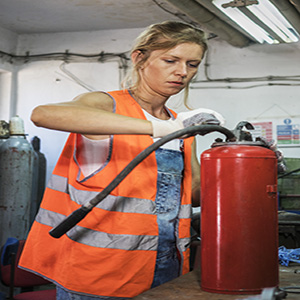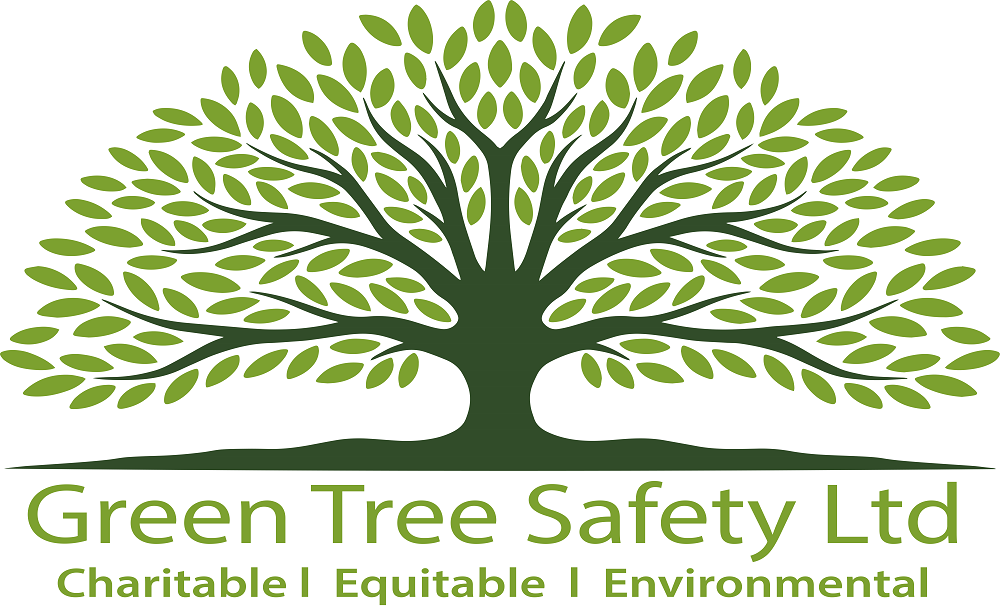Fire Extinguishers - Rental
Our fixed price fire extinguisher rental service gives you the peace of mind in knowing that you have a fixed annual fee, a professional company looking after you and ultimately you have legal compliance. Extinguisher rental can be a perfect solution if you have a requirement to install multiple exinguishers. It saves you the costs of a significant capital expense.
Our FETA qualified engineers will assess your premises to ensure that Fire Extinguisher placement is correct. We often see water extinguishers adjacent to an electrical hazard...not a good combination.
- Call us for an instant quote
- Professional fully trained multi-skilled engineers
- Fully insured professional advice from a company you can trust

We service your extinguishers in accordance to the BS 5306-3:2017 - Providing you with legal protection and peace of mind
- Flexible service, get an inspection tailored to your business's needs
- Fulfil your business's legal and insurance requirements
- Many years of experience in the industry, established in 2006
- All servicing done in accordance to the BS 5306-3:2017
- Our expert services allow you to focus on your core business
- We won't be beaten on price. Call to find out about our price guarantees
- Fully Qualified StaffWe aim to beat any quote
- Free initial consultation
- Save up to 50%, See how much you could save with our competitive prices
If you are responsible for fire safety for a company, then you must make sure your fire extinguisher servicing is carried out yearly to meet current fire safety laws.
Fire extinguisher maintenance is required to make sure your extinguishers are in full working order in the case of a fire.
All of our extinguisher engineers are FETA qualified and provide thorough fire extinguisher servicing and maintenance in the South East of England.
Call our professional, friendly team and discuss your requirements 08000 24 11 24.
Please see below for more information.
– We cover the whole South-East for fire extinguisher servicing
– Industry certified, FETA qualified extinguisher engineers
– All makes and types of fire extinguisher serviced
– Service plans for all budgets, including fixed-price
– Full servicing & certification to current British Standards
– A comprehensive range of spare parts carried by our multi-skilled, ensuring your premises are left fully certified
– Wall brackets fixed, and extinguisher stands provided where required
Your fire extinguishers should be appropriately serviced once a year by a fully qualified fire extinguisher engineer.
The tamper pin: this has a dual role. It holds the safety pin in position, it also lets you see whether or not the fire extinguisher has been operated. Our engineers check whether your extinguisher has been used and will recharge and pressurise where possible.
The pressure gauge: informs you whether or not the fire extinguisher is fully pressurised to the correct level. Occasionally the gauge needle can 'stick' as a result of damage or condensation which means the extinguisher could have lost all it's pressure. Rendering the extinguisher unoperable however; the gauge indicates all is well. Our team will check this for you.
The extinguisher body: if the external body of the fire extinguisher shows signs of dents, corrosion or gouges. It could be unsafe and may even rupture. We ensure all of your fire extinguishers are sound and damage-free.
Your fire extinguishers must have a label which provides information about its ratings, operation and refilling. If any of the text is no longer legible, then the extinguisher will need to be removed from service.
The extinguisher hose: our tema will check the fire extinguisher hose isn't broken, torn or frayed, otherwise, it may not work correctly in the event of a fire.
Our specialist engineers take their jobs very seriously, they take pride in leaving our clients fully compliant with the law and their premises and teams safe. Ring Freephone 08000 24 11 24 today for a fast, friendly fixed quote, or use our contact form from the floating menu on the left.
Extinguisher Regulations in the UK – an explanation to the legislation for fire extinguishers in 2019.
Extinguisher regulations in the UK can appear a little complex. We have provided a simplified guide to the UK's laws on fire extinguishers.
As with all fire safety legislation in the UK, Extinguisher regulations form part of 'The Regulatory Reform (Fire Safety) Order 2005'.
All buildings used for non-domestic purposes, with a few minor deviations, come under this order.
legislation has been responsible for dramatically reducing business fires in the UK, it can be challenging to fully interpret if you're not a fire safety expert – which is why we have provided most frequently asked questions below as clearly and efficiently as possible.
The regulations state that you should have at least of two 'Class A' extinguishers on every floor of the building. Class A fire extinguishers are those which extinguish wood or paper fires, also known as 'carbonaceous' fires.
Class A fire extinguishers matching this regulation are:
– 3 litre foam extinguishers.
– 6 litre foam extinguishers.
– 9 litre water extinguishers.
So you require at least two of the above on each floor.
Exceptions to the law: if your premises are very small and it would be a obstacle to exit the areas having two extinguishers, then only one can be used. An example would be a Coffee kiosk.
Depending on the equipment in your company premises, you are likely to require other types of extinguisher.
The most common of those are CO2 extinguishers which are utilised to fight electrical fires.
UK extinguisher regulations define:
– All premises with electrical devices must have at least 2kg CO2 extinguisher
– Where there is 415 volt rated electrical equipment, then 5kg CO2 extinguishers are needed
Other kinds of extinguisher you may need are:
– Dry powder extinguishers:- for gas, propane risk, e.g. in boiler rooms (not recommended for other indoor applications)
– Wet chemical extinguishers:- for kitchens with deep-fat fryers
The 'standard pair' foam-based and CO2 fire extinguishers are usually located adjacent to exits and fire alarm call points.
Exceptions to the law: if your premises has a lot more exits or fire alarm call-points than the number of extinguishers you require, then the 30 metre rule applies:
The 30-metre rule comes from UK British Standard (BS5306) and states that you should be no more than 30-metres from the relevant extinguisher on any given floor of your premises.
'Specialist' fire extinguishers, such as wet chemical and powder should be located within easy reach of the particular fire hazard.
To comply with the regulations, extinguishers should be either secured to the wall, or attached to a stand.
This is to deter people from moving them around, for example, using them to hold doors open.
All extinguishers should also be clearly signed with fire extinguisher ID signs secured to the stand or the wall. Extinguisher signs describe which type of extinguisher they are, and how and when to use them.
If you decide to purchase online, please be sure that they are the correct type, size for your buildings and that you know where to situate them.
Extinguishers must be commissioned on-site by a skilled person. This usually means someone who has passed the BAFE fire extinguisher exam or has an equivalent qualification like FETA.
Unfortunately, extinguishers cannot be commissioned before they are installed. This is because problems can occur during the installation itself.
For this reason, you will normally still need to contact a fire extinguisher company to commission your fire extinguishers, even though you purchased them online.
'Commissioning' implies that your fire extinguishers have been completely checked and approved as fit for use.
Fire extinguishers are not compliant with fire extinguisher legislation until they have been fully commissioned, even if you have the correct types and sizes of extinguisher in the right positions.
Examples of things checked throughout commissioning are:
– Extinguishers have been assembled correctly
– Hoses and horns are correctly connected
– They are of the right pressure or weight
– They are damage free
Our extinguisher engineers will provide you with a certificate as confirmation that your extinguishers have been commissioned in accordance with UK law.
A fire extinguisher service examines a number of things:
– Is the extinguisher in servicible date?
– Is it in visiblyin good condition?
– Has it been tampered with?
– Is the weight, pressure correct?
– Does the tamper pin work?
– Is the hose in good condition?
– Are the instructions on the extinguisher legible, with the label intact?
On completion of the service, the engineer will be ready to tell you which extinguishers need replacing or advise on further extinguishers you may need to bring you in line with the regulations.
During a health and safety executive or fire brigade visit; you need to show that your extinguishers have been adequately serviced, there are several they look for:
A service label on the extinguisher noting that it has been serviced in the last year and telling when the next service is due.
The service label will record the result of the last service as one of the following:
– acquired a basic service
– was refilled, recharged
– needs replacing (in which case a new extinguisher should have been installed)
There will be a plastic strap or disk preventing the pin being inadvertantly pulled out, such as an Anti-tamper tag.
Exception to the rule:- this is not the case for extinguishers with plastic pins which have a different design. For these sorts of extinguisher, the pin itself should be replaced annually.
The O-Ring should have been replaced.
An O-Ring ensures the fire extinguisher has an proper seal ).
That you have an in-date service certificate from a qualified individual or organisation.
UK fire extinguisher regulations advise that extinguishers should be replaced or fully stripped down every 5 years, except for CO2 extinguishers which should be changed every 10 years. However; if an extinguisher is damaged, discharged or cannot be used safely, then it should be replaced immediately.
For environmental reasons, it is not recommended to decant the contents of fire extinguishers into drains.
Latest guidelines indicate replacing extinguishers rather than refilling them – because the residue would have to be disposed of by expert means.
We hope this simple guide has been valuable to you.
If you're still uncertain on fire extinguisher regulations, or you need particular advice for your business, we can organise for one of our accredited engineers to visit your premises and carry out a free, no-obligation survey.
Just get in touch with our friendly professional team by calling on Freephone 08000 24 11 24.
